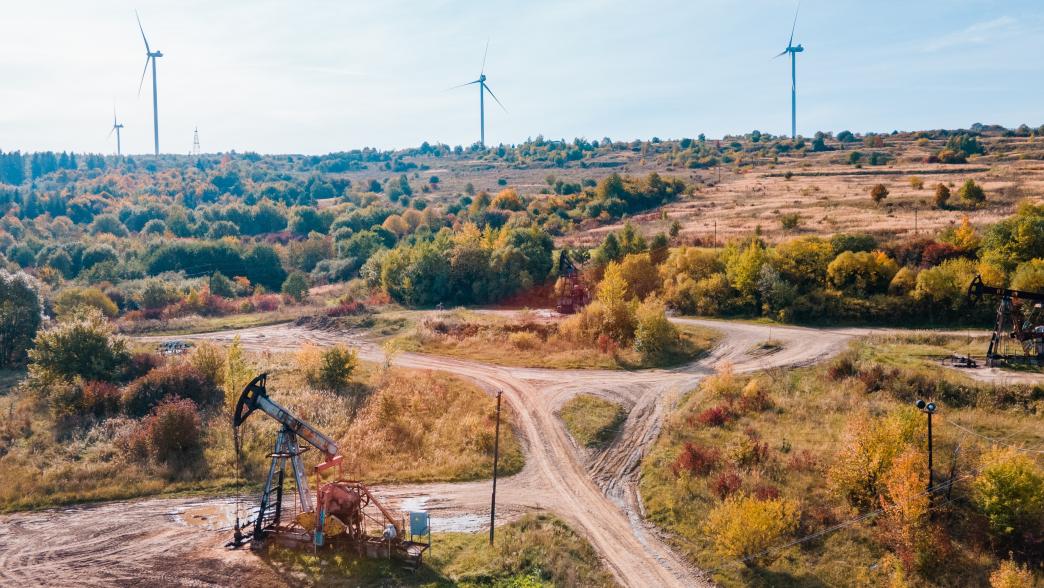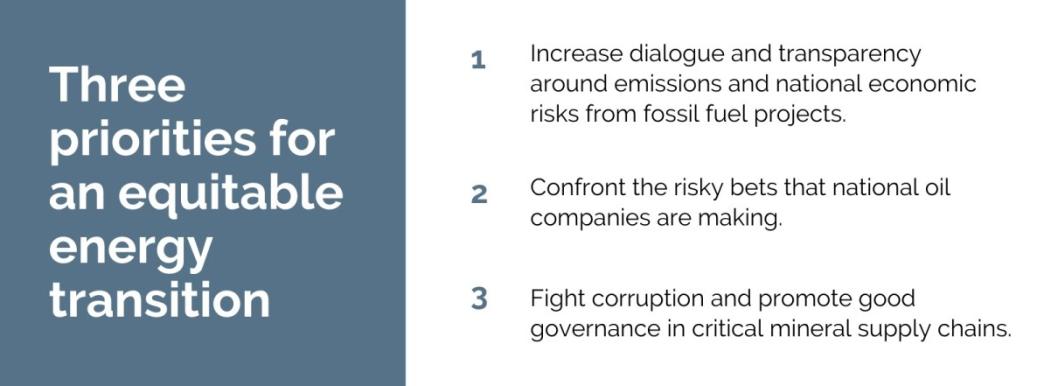
Reflections on an Equitable Energy Transition from COP26
Reactions to emissions agreements reached at COP26 earlier this month were decidedly mixed. But one theme that emerged clearly from the dialogue surrounding the negotiations was the need for a just and equitable energy transition.
Developing countries that rely upon, or have been hoping to exploit, endowments of fossil fuels are in a unique predicament. They face the prospect of stranded assets and are caught between the global need to reduce fossil fuel consumption and their ambitions to economically develop, especially amid the turmoil wrought by the coronavirus pandemic. “In this challenging context, developing new producer countries are trying to figure out how to finance both their development and energy transition ambitions,” said NRGI’s Amir Shafaie as he moderated an event convened by NRGI, the Commonwealth Secretariat and the New Producers Group.
And in her intervention at Carbon Tracker’s “Energy Transition and the Far-Reaching Implications,” NRGI’s Nafi Chinery observed that “countries like Ghana need climate finance for their transition, but also a plan for how to spend transparently and based on stakeholder consultation and consensus.”
(This was one of three steps to a just and equitable energy transition outlined during COP by NRGI’s Suneeta Kaimal and Aaron Sayne, who also called for a focus on anticorruption in critical mineral supply chains.)
Chinery suggested that “the Ghanaian government needs a comprehensive outlook on energy transition that accounts for all risks and opportunities. Earlier this year the government proposed borrowing up to $1.6 billion to buy back offshore oil blocks, but this was based on a poor valuation and was extremely risky.”
Some saw previous COPs’ focus on the consumption of fossil fuels as lopsided. “We should have put fossil fuel supply on the table back in Rio, instead of focusing solely on emissions,” said Niclas Hallstrom of the What Next Forum. At the same event, Carbon Tracker’s Mike Coffin warned that “more than 400 million people live in countries with more than 20 percent of government revenue at risk due to oil investment. Oil-dependent countries must diversify their economies immediately. And other countries should not become petrostates; they must not double down.”
Engaging with oil-dependent states on their needs and with state-owned oil companies on their ambitions is critical at this juncture, as NRGI experts had highlighted in their contributions on state oil companies to October’s Production Gap Report. To further enable targeted advocacy, during COP NRGI and IISD released a joint briefing, “National Oil Companies and Climate Change: Insights for Advocates,” authored by several experts on state oil producers. Key points include:
- National oil companies are national. Engaging with them means engaging with the ambitions of their countries’ governments and citizens.
- Interests cloud perception of risks. National oil companies and their governments don't fully appreciate the economic risks associated with their investments.
- Economic development matters. National oil companies won’t change without public pressure and international support to diversify their countries’ economies.
- National oil companies differ. Climate and development advocates should tailor their strategies to distinct types of national oil companies, which present varying opportunities and challenges for reform.
- Renewable energy can be an opportunity or an obstacle. National oil company investment in renewables can boost the energy transition and give NOCs a stake in it, but can be counter-productive in some cases.
NOCs face especially high expectations and responsibilities in countries that have been planning to move into petroleum production and where “governments are wrestling with what the global imperative to shift away from fossil fuels means for them,” as Shafaie said at the new producers event.
The unique situation faced by these countries was illustrated by Agnes Moensi-Sokowikromo, COP delegate and chief financial officer of Suriname’s NOC Staatsolie. She observed: “Suriname’s recent oil discoveries are opportunities to stabilize the economy. We need these revenues now for social programs and the development of sustainable sectors to diversify the economy. On the other hand, Suriname is one of the few carbon-negative countries.”
Reducing fossil fuel consumption and production remains an essential area for climate action. In tackling this global problem, policymakers and activists must also keep in mind the challenges resource-rich developing countries face in the energy transition. NRGI and its partners Chatham House and the Commonwealth Secretariat continue to develop these themes through the New Producers Group, meeting on the key takeaways from COP and their implications for the policy and implementation challenges facing low-income, low-emissions new petroleum producers. This will remain a key priority for NRGI in 2022.
Hear more from Suneeta Kaimal on the energy transition in her podcast with Critical Resource.
Authors

Lee Bailey
Communications Director

